
Aldous Leonard Huxley was an English writer and philosopher. His bibliography spans nearly 50 books, including novels and non-fiction works, as well as essays, narratives, and poems.
Agnosticism is the view or belief that the existence of God, of the divine or the supernatural is unknown or unknowable. It can also mean an apathy towards such religious belief and refer to personal limitations rather than a worldview. Another definition provided is the view that "human reason is incapable of providing sufficient rational grounds to justify either the belief that God exists or the belief that God does not exist."

Darwinism is a theory of biological evolution developed by the English naturalist Charles Darwin (1809–1882) and others, stating that all species of organisms arise and develop through the natural selection of small, inherited variations that increase the individual's ability to compete, survive, and reproduce. Also called Darwinian theory, it originally included the broad concepts of transmutation of species or of evolution which gained general scientific acceptance after Darwin published On the Origin of Species in 1859, including concepts which predated Darwin's theories. English biologist Thomas Henry Huxley coined the term Darwinism in April 1860.
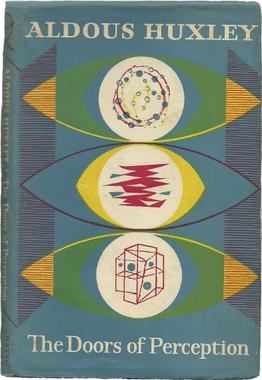
The Doors of Perception is an autobiographical book written by Aldous Huxley. Published in 1954, it elaborates on his psychedelic experience under the influence of mescaline in May 1953. Huxley recalls the insights he experienced, ranging from the "purely aesthetic" to "sacramental vision", and reflects on their philosophical and psychological implications. In 1956, he published Heaven and Hell, another essay which elaborates these reflections further. The two works have since often been published together as one book; the title of both comes from William Blake's 1793 book The Marriage of Heaven and Hell.
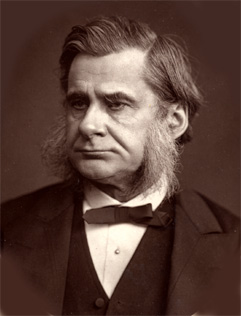
Thomas Henry Huxley was an English biologist and anthropologist who specialized in comparative anatomy. He has become known as "Darwin's Bulldog" for his advocacy of Charles Darwin's theory of evolution.

Brave New World is a dystopian novel by English author Aldous Huxley, written in 1931 and published in 1932. Largely set in a futuristic World State, whose citizens are environmentally engineered into an intelligence-based social hierarchy, the novel anticipates huge scientific advancements in reproductive technology, sleep-learning, psychological manipulation and classical conditioning that are combined to make a dystopian society which is challenged by the story's protagonist. Huxley followed this book with a reassessment in essay form, Brave New World Revisited (1958), and with his final novel, Island (1962), the utopian counterpart. This novel is often compared as an inversion counterpart to George Orwell's 1984 (1949).

Sir Julian Sorell Huxley was a British evolutionary biologist, eugenicist, and internationalist. He was a proponent of natural selection, and a leading figure in the mid-twentieth century modern synthesis. He was secretary of the Zoological Society of London (1935–1942), the first Director of UNESCO, a founding member of the World Wildlife Fund, the president of the British Eugenics Society (1959–1962), and the first president of the British Humanist Association.
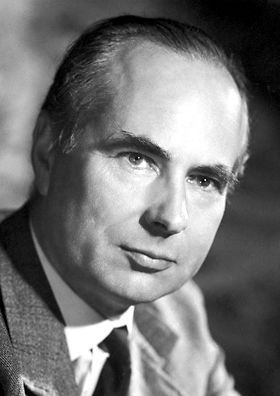
Sir Andrew Fielding Huxley was an English physiologist and biophysicist. He was born into the prominent Huxley family. After leaving Westminster School in central London, he went to Trinity College, Cambridge, on a scholarship, after which he joined Alan Hodgkin to study nerve impulses. Their eventual discovery of the basis for propagation of nerve impulses earned them the Nobel Prize in Physiology or Medicine in 1963. They made their discovery from the giant axon of the Atlantic squid. Soon after the outbreak of the Second World War, Huxley was recruited by the British Anti-Aircraft Command and later transferred to the Admiralty. After the war he resumed research at the University of Cambridge, where he developed interference microscopy that would be suitable for studying muscle fibres.
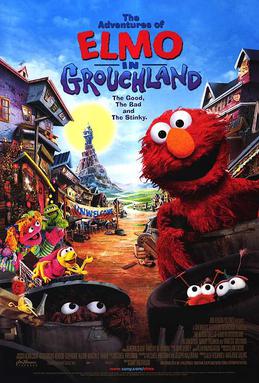
The Adventures of Elmo in Grouchland is a 1999 American musical adventure comedy film directed by Gary Halvorson in his feature film debut. This was the second of the two theatrical feature films to be based on the children's television series Sesame Street, after Sesame Street Presents: Follow That Bird. It stars Mandy Patinkin and Vanessa Williams alongside Muppet performers Kevin Clash, Caroll Spinney, Steve Whitmire, and Frank Oz.

Sauropsida is a clade of amniotes, broadly equivalent to the class Reptilia, though typically used in a broader sense to also include extinct stem-group relatives of modern reptiles and birds. The most popular definition states that Sauropsida is the sibling taxon to Synapsida, the other clade of amniotes which includes mammals as its only modern representatives. Although early synapsids have historically been referred to as "mammal-like reptiles", all synapsids are more closely related to mammals than to any modern reptile. Sauropsids, on the other hand, include all amniotes more closely related to modern reptiles than to mammals. This includes Aves (birds), which are recognized as a subgroup of archosaurian reptiles despite originally being named as a separate class in Linnaean taxonomy.

John Maler Collier was a British painter and writer. He painted in the Pre-Raphaelite style, and was one of the most prominent portrait painters of his generation. Both of his marriages were to daughters of Thomas Henry Huxley. He was educated at Eton College, and he studied painting in Paris with Jean-Paul Laurens and at the Munich Academy starting in 1875.
The Huxley family is a British family; several of its members have excelled in science, medicine, arts and literature. The family also includes members who occupied senior positions in the public service of the United Kingdom.

Hugh Esmor Huxley MBE FRS was a British molecular biologist who made important discoveries in the physiology of muscle. He was a graduate in physics from Christ's College, Cambridge. However, his education was interrupted for five years by the Second World War, during which he served in the Royal Air Force. His contribution to development of radar earned him an MBE.
Huxley Pig is a British stop motion animated children's television series based on a series of picture books authored by Rodney Peppé.

The Terra NovaExpedition, officially the British Antarctic Expedition, was an expedition to Antarctica which took place between 1910 and 1913. Led by Captain Robert Falcon Scott, the expedition had various scientific and geographical objectives. Scott wished to continue the scientific work that he had begun when leading the Discovery Expedition from 1901 to 1904, and wanted to be the first to reach the geographic South Pole.

Julian Huxley is an Australian rugby union professional footballer. In 2008 he had established himself in the Wallabies and was named Australian Rookie of the Year. In 2011 he played for the Melbourne Rebels in the Super Rugby competition.
Huxley is a hamlet in southern Alberta, Canada within Kneehill County. It is located approximately 160 km (99 mi) northeast of Calgary. The first school was built in 1907 and named Ashcroft for John Courtland Ash, the first rancher in the area, predating the surveying of the area into homesteads.

Huxley is a small rural village and former civil parish, now in the parish of Hargrave and Huxley, in the Cheshire West and Chester district, and ceremonial county of Cheshire in England. In 2001 the parish had a population of 220, increasing to 251 at the 2011 Census. The civil parish was abolished in 2015

Prior's Field is an independent girls' boarding and day school in Guildford, Surrey in the south-east of England. Founded in 1902 by Julia Huxley, it stands in 42 acres of parkland, 34 miles south-west of London and adjacent to the A3 road, which runs between the capital and the south coast.
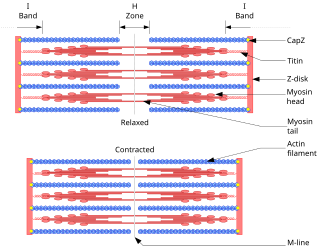
The sliding filament theory explains the mechanism of muscle contraction based on muscle proteins that slide past each other to generate movement. According to the sliding filament theory, the myosin of muscle fibers slide past the actin during muscle contraction, while the two groups of filaments remain at relatively constant length.















